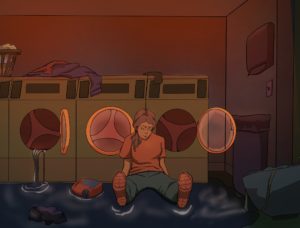This post was updated Feb. 27 at 7:34 p.m.
On the Hill, the piano isn’t just an instrument. It is the ambience of an evening in Sunset Village, the music before or after a meal at Bruin Plate or the beginning of a friendship.
The pianos were first brought onto the Hill in 2019 through a student-run initiative called the Piano Project, which was founded by a UCLA alumnus to foster community through music.
Supported by the Semel Healthy Campus Initiative Center and the UCLA Herb Alpert School of Music, the project was a collaborative effort. The Schoenberg Music Building donated four pianos, and students, staff and faculty decided where to place them, according to a written statement from UCLA Housing.
Kelvin De Leon, a fourth-year economics student, said he enjoys practicing the piano every day on the Hill, as it allows him to cultivate friendships with other piano players along the way.
“It’s a nice little community, and everybody knows each other,” De Leon said. “I’ve made a lot of friends just by standing around when someone’s playing and then talking to them when they’re done.”
Despite the joys of building community through shared music interests, the current state of the pianos on the Hill is subpar. There are currently two publicly available pianos – one outside Bruin Plate and one in Covel Commons – and the music rooms of Sproul Hall, Rieber Hall and Hedrick Hall host a few other pianos for reservation. Nonetheless, most of them suffer from broken strings and keys, or their pitch is out of tune. The poor quality of the pianos makes the player’s experience unsatisfactory.
“We kind of just play around it,” De Leon said. “That’s not to say that I don’t enjoy coming to play, but there’s keys that are missing there to be careful with.”
The university’s lack of attention to the maintenance of pianos on the Hill does a disservice to student musicians and their abilities to easily access quality pianos in a plethora of locations. With a shortage of pianos on the Hill, students are restricted to having only two publicly available pianos, which are frequently occupied. It goes without question that this is simply not enough to attract enthusiasts and returning piano players.
According to the National Endowment for the Arts, the national percentage of people playing the piano is 5%. With over 13,000 students living in on-campus housing facilities, there is a substantial population on the Hill who can play and would benefit from additional pianos.
For non-music majors, opportunities to play good-quality pianos are scarce. Although the Schoenberg Music Building has practice rooms with acoustic pianos, a student has to be enrolled in a music class to access them, meaning that most non-music majors are excluded from utilizing these resources.
“UCLA is a large enough school with enough talented and both skilled and nonskilled pianists that we should have a lot more options for non-majors to use pianos,” said James Lent, a lecturer in the School of Music. “I would love to see the dorms … add some electronic keyboards to their recreation rooms, so that’s a very cost-effective way to give beginning pianists access to keyboards that are not out of tune.”
Although keyboards are great for beginner pianists, public acoustic pianos create a space for community building and appeal to advanced pianists. While the incorporation of keyboards could certainly be a short-term solution, in the long run, UCLA Housing could add more acoustic pianos on the Hill by collaborating with the School of Music.
With the Piano Project appearing to be discontinued, as its last social media post was around three years ago, it is imperative to continue calling for more robust piano services.
UCLA Housing said in the statement its plans for expansion were put on hold during the COVID-19 pandemic. Since then, no new groups working toward improving the piano situation have emerged.
The maintenance and expansion of the pianos on the Hill is not only a matter of more music but also of solidarity. Music, especially the piano, has an indescribable way of bringing people together, whether they are playing, listening or even joining in on a different instrument. Gathering around a piano and enjoying music in some form is a highly underrated social activity.
Furthermore, participating in music can have a positive impact on mental health by providing a medium for people to express themselves and relieve stress from the academic rigor of college. A 2019 study found that college students who listened to classical music every day for two months are more likely to feel more positive about themselves and have better relationships with others.
Indeed, many Bruins credit music for being essential to uplifting their mental health.
Wei-Hsuan (Cheyenne) Lu, a first-year cognitive science and statistics and data science student, said playing piano is a hobby that takes her mind off of school work, especially when playing with friends.
“It’s a really nice way to take a break from your studying, especially when you get so lost. … You take a break to play, and you remember that not all your problems exist on the screen,” Lu said.
In order to ensure that students are able to take full advantage of the many benefits offered by playing the piano, this starts with the bare minimum of maintenance. The university should delegate who will be responsible for tuning and repairing all the pianos regularly, along with handling complaints and drawing adequate funding.
“Someone needs to just decide they’re going to be in charge of this problem and solve it and figure out how to raise money and collect resources to improve it, and then one or two staff members could probably take care of the problem slowly but surely and fix the pianos we have,” Lent said.
Pianos on the Hill are more than just a reflection of a vibrant community. They are an inseparable part of the Hill’s culture and student life.
By taking care of its pianos, UCLA is looking after its students’ mental health, well-being and pursuit of enjoyment.






Comments are closed.